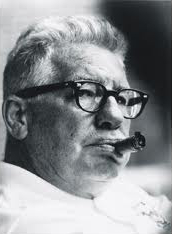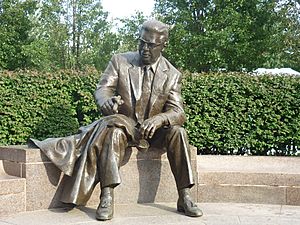Art Rooney facts for kids

Image of Rooney from "BELIEVE" posters
|
|
| Position: | Owner |
|---|---|
| Personal information | |
| Born: | January 27, 1901 Coulterville, Pennsylvania, U.S. |
| Died: | August 25, 1988 (aged 87) Pittsburgh, Pennsylvania, U.S. |
| Career information | |
| High school: | Duquesne University Prep |
| College: | Indiana Normal, Georgetown |
| Career history | |
| As executive: | |
|
|
| Career highlights and awards | |
|
|
|
Pro Football Hall of Fame
|
|
Arthur Joseph Rooney Sr. (January 27, 1901 – August 25, 1988), often called "the Chief", was the person who started the Pittsburgh Steelers football team. He owned the team, which is part of the National Football League (NFL), from 1933 until he passed away. Rooney is a member of the Pro Football Hall of Fame. He was also a talented boxer who almost made it to the Olympics. He owned parts of several other sports teams and venues in the Pittsburgh area. He was the first president of the Steelers from 1933 to 1974, and the first chairman from 1933 to 1988.
Contents
Art Rooney's Family History
Art Rooney's family came from Ireland. His great-grandparents, James and Mary Rooney, moved from Ireland to Canada in the 1840s during a time called the Great Famine. Later, they moved to Wales, where their grandson Dan Rooney was born.
In 1884, Dan Rooney's family moved to Pittsburgh, Pennsylvania. Dan Rooney stayed in Pittsburgh and opened a cafe and saloon. This is where he met and married Margaret "Maggie" Murray. Their first son, Arthur Joseph Rooney, was born in Coulter, Pennsylvania. In 1913, Art's family moved to the North Side of Pittsburgh. Their home was very close to Exposition Park (Pittsburgh), where the Pittsburgh Pirates baseball team used to play.
Education and Sports Talents
Art Rooney went to St. Peter's Catholic School in Pittsburgh. He also studied at Duquesne University Prep School and other colleges. He even got a scholarship for sports at Temple University.
After college, Art Rooney focused on sports. He was a great boxer and won a championship belt in 1918. He even tried out for the 1920 Olympic boxing team. He also played minor league baseball for teams like the Flint "Vehicles" and the Wheeling "Stogies." In 1925, he was a player-manager for Wheeling and was one of the best hitters in the league. Art also played football as a halfback for semi-pro teams in Pittsburgh. He later took over these teams and eventually bought an NFL team for $2,500 in 1933.
Starting the Pittsburgh Steelers
Art Rooney became involved with the National Football League (NFL) in 1933. He paid $2,500 to start a football team in Pittsburgh. He first named his new team the "Pirates," just like Pittsburgh's baseball team, which he loved.
The NFL had wanted a team in Pittsburgh for a long time. This was because Pittsburgh had a strong history with American football. Also, the Pittsburgh Panthers football team was very popular. The league could finally have games in Pittsburgh on Sundays because a law that stopped sports on Sundays was changed.
In 1936, Rooney won a lot of money, about $160,000, from a horse racing bet. He used this money to improve his team. He hired a coach and gave players better contracts. This helped the team become much stronger.
Rooney made a big splash in the NFL in 1938 by signing Byron White for a record $15,000. But even with this star player, the team didn't have a winning season. White left the team the next year. The team didn't have a winning record until 1942, which was the year they changed their name to the Pittsburgh Steelers.
During World War II, the Steelers faced money problems. They had to combine with other teams for a short time. In 1943, they merged with the Philadelphia Eagles to form the Steagles. In 1944, they combined with the Chicago Cardinals to form "Card-Pitt."
After the war, Rooney became the team president. He really wanted to win an NFL championship for Pittsburgh. But his team struggled against strong teams like the Cleveland Browns and Green Bay Packers. The Steelers were also seen as less important than the baseball team in Pittsburgh. The team also made some tough decisions, like letting go of a player named Johnny Unitas, who later became a Hall of Fame quarterback for another team.
Even with these challenges, Rooney was well-liked by other team owners. He was known for being a good mediator. He was the only owner who voted against moving a team to Dallas in 1951. He was worried about racism in the South at that time. In 1963, he and George Halas were the only two owners who voted to give a championship title back to a team from 1925.
Pittsburgh Penguins Hockey Team
Art Rooney was a very important person in Pittsburgh. Because of his influence, he was asked to help the city get a new NHL team in 1967. Pittsburgh had a professional hockey team before, but it was a "minor league" team. City leaders wanted a "major league" team. Rooney used his connections in the sports world to help Pittsburgh get a new team. From 1967 until the early 1970s, he was a part-owner of the Pittsburgh Penguins hockey team.
Supporting the Homestead Grays
In an interview in 1981, Art Rooney shared that he sometimes helped the Homestead Grays financially. The Grays were a team in the Negro league baseball. Rooney said he was even more of a baseball fan than a football fan.
Owning Track Sports Venues
Art Rooney also owned several places where track sports, like horse racing and dog racing, took place. In 1972, he bought the Yonkers Raceway. He also owned the Palm Beach Kennel Club, Green Mountain Kennel Club, Shamrock Stables, and the Liberty Bell Park Racetrack.
Later Life and Steelers Success
After the AFL–NFL merger in 1970, the Steelers joined the AFC Central Division.
Thanks to smart scouting, the Steelers became a very strong team. In 1972, they started an amazing eight-year streak of making it to the playoffs. They also had 13 straight years of winning seasons. In Rooney's 41st season as owner, the Steelers won their first Super Bowl. During his lifetime, the team won three more Super Bowls in 1975, 1978, and 1979. The Steelers later won two more Super Bowls in 2005 and 2008, becoming the first team after the AFL–NFL merger to win six Super Bowls.
After the Steelers won Super Bowl IX, Rooney stepped back from the daily running of the team. However, he remained the main authority until he passed away. His son, Dan Rooney, took over as team president. Art Rooney died on August 25, 1988, after having a stroke. In his memory, the Steelers wore a patch with his initials AJR on their uniforms for the entire 1988 season. He is buried in the North Side Catholic Cemetery in Pittsburgh.
Art Rooney's Legacy
In 1964, Art Rooney was chosen for the Pro Football Hall of Fame. Duquesne University named their football field after him in 1993. In 1999, he was ranked 81st on the Sporting News' list of "100 Most Powerful Sports Figures of the 20th Century."
There is a statue of Art Rooney at the entrance to Acrisure Stadium, where the Pittsburgh Steelers play. The street next to the stadium is also named "Art Rooney Avenue" in his honor. In 2000, he was inducted into the American Football Association's Semi-Pro Football Hall of Fame as a "pioneer."
During Rooney's time, the Steelers often picked a player from a local college in the later rounds of the draft. These colleges included Pitt, West Virginia, or Penn State. These players didn't always make the team, but it was a way to connect with local fans and players.
Art Rooney is also the only character in a one-man play called The Chief.
Arthur J. Rooney was married to Kathleen Rooney for 51 years until she passed away in 1982. They had five sons: Dan Rooney, Art Rooney Jr., Timothy Rooney, Patrick Rooney, and John Rooney. All of them have been involved with the Pittsburgh Steelers. Kathleen and Art also had 32 grandchildren, including the current Steelers president Art Rooney II and former U.S. Representative Thomas J. Rooney. They also have about 75 great-grandchildren, including actresses Kate Mara and Rooney Mara.
See also
 In Spanish: Art Rooney para niños
In Spanish: Art Rooney para niños
 | Janet Taylor Pickett |
 | Synthia Saint James |
 | Howardena Pindell |
 | Faith Ringgold |


